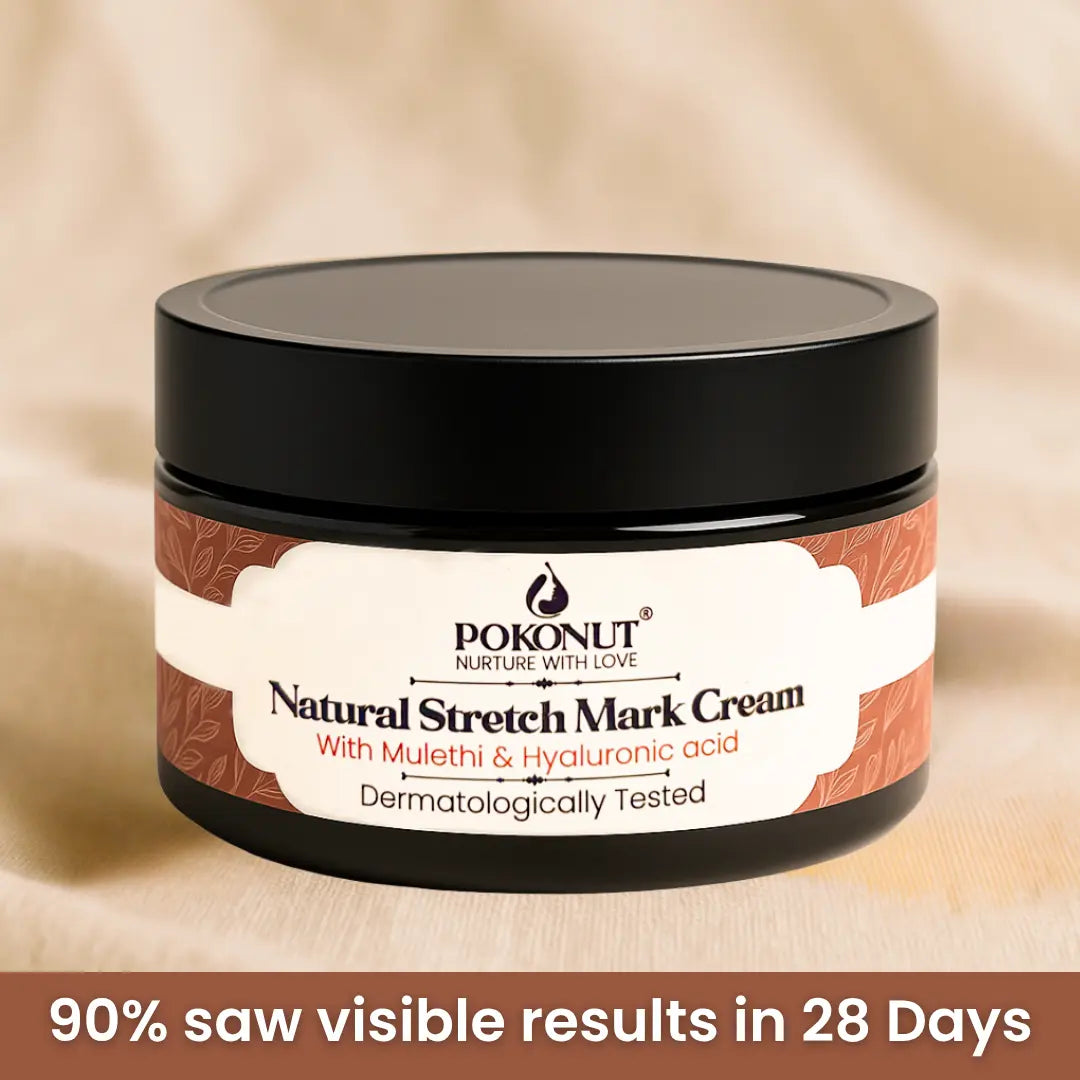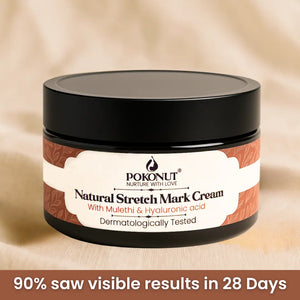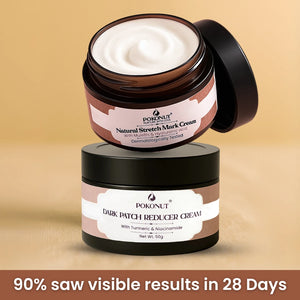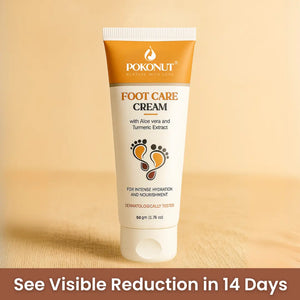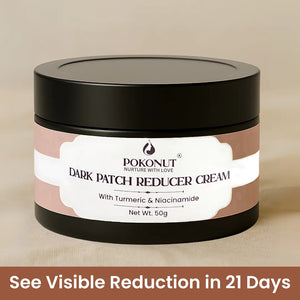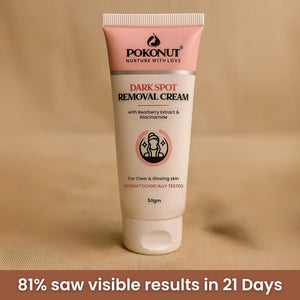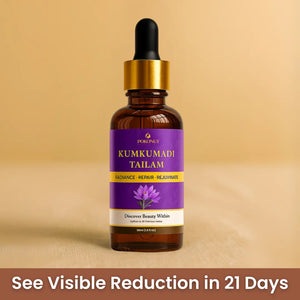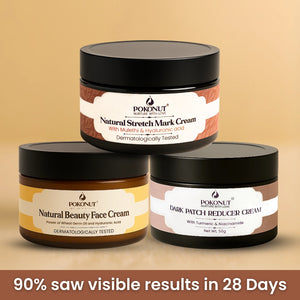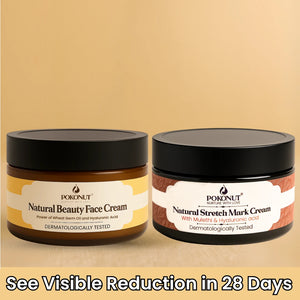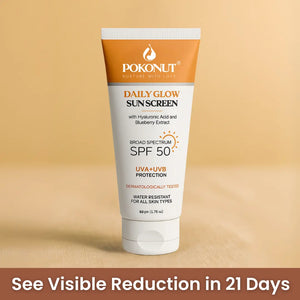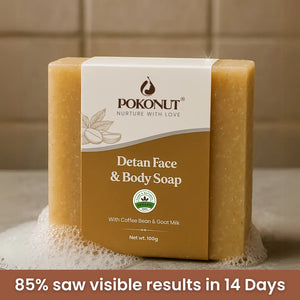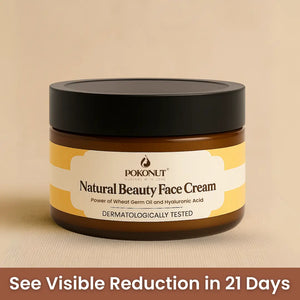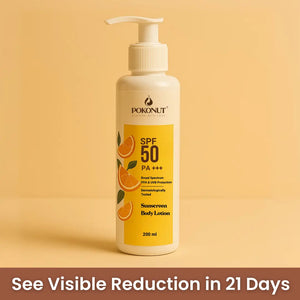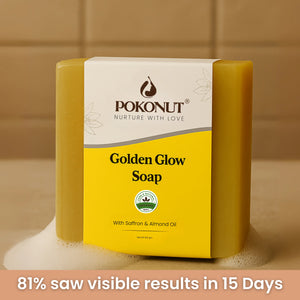How to Treat Acne During Pregnancy?

Medically Reviewed By:
Dr. Neeraj Bansal, BAMS
Written by Our Editorial Team
If you're experiencing acne during pregnancy, you're not alone—and it’s more common than most people realise. A study published in the National Institutes of Health found that nearly 35.7% of pregnant women experience acne flare-ups due to hormonal shifts during gestation. (Source: https://pmc.ncbi.nlm.nih.gov/articles/PMC7254075/).
These hormonal surges, especially progesterone, increase oil production, clog pores, and create the perfect environment for pregnancy acne. Many women notice sudden breakouts or pregnancy pimples on face, cheeks, jawline and sometimes even the back. While hormonal acne can be stubborn, the good news is that it can be managed safely during pregnancy with gentle, pregnancy-approved routines.
This guide explains exactly how to treat acne during pregnancy—scientifically, safely, and without harsh chemicals.
Why Pregnancy Causes Acne
During pregnancy, your body undergoes significant hormonal changes, especially an increase in progesterone. Progesterone stimulates your sebaceous (oil) glands to produce more sebum, making pores more likely to get clogged. At the same time, cell turnover tends to slow, so dead skin cells accumulate more, adding to blockages. Stress, fatigue, excess sweating and makeup changes also contribute to flare-ups. The result: you may see pregnancy pimples on face, cheeks or jawline even if you never had acne before.
It’s important to recognise that pregnancy acne is slightly different from typical adult acne because your hormone levels, immune system and skin barrier are all in flux.
Pregnancy-Safe Skincare Routine for Treating Acne
Gentle Cleansing

Because your skin is more sensitive during pregnancy, choose a pH-balanced, fragrance-free cleanser. Over-cleansing or using harsh foams will strip natural oils, disrupt the barrier and trigger more oil production and breakouts. Instead, wash your face twice a day with a gentle formula containing soothing ingredients like aloe, green tea or oatmeal.
In addition, many expecting moms find that mild botanical cleansers or an anti acne products like anti acne soap formulated with calming herbs (such as turmeric or neem) can help keep skin clean without harshness—especially when you want safe options for acne during pregnancy.
Hydration for Barrier Support
Even oily or breakout-prone skin needs hydration. During pregnancy, your barrier is working overtime to adapt to changes, so it needs support. Use a lightweight, non-comedogenic moisturiser with ingredients like ceramides, aloe vera or niacinamide. These help normalise oil production, strengthen your barrier and reduce irritation—key steps when managing pregnancy pimples on face.
Sunscreen to Prevent Marks
Sun exposure may not cause acne directly, but it can worsen redness and deepen post-acne marks—making pregnancy acne look more stubborn. Choose a mineral sunscreen (zinc oxide or titanium dioxide) with non-comedogenic, gentle formulation and apply it daily. Protecting your skin from UV rays ensures your acne healing process isn’t undermined by pigmentation.
Natural and Pregnancy-Safe Ingredients for Acne
Here are ingredients you can safely consider (always patch test and check with your OB/derm):
-
Aloe Vera: Soothes inflamed skin and supports healing.
-
Honey (Raw or Manuka): Has mild antibacterial and wound-healing properties; useful for fresh pimples.
-
Turmeric (Curcumin): Natural anti-inflammatory that can help calm red, swollen lesions.
-
Green Tea Extract: Helps regulate oil production and reduce inflammation, helping overall skin tone.
-
Niacinamide: Research supports its safety in pregnancy when used topically; reduces oil output, improves barrier and decreases redness.
These ingredients won’t work overnight, but when combined with a gentle routine they support clearer skin and fewer new breakouts.
Ingredients and Treatments to Avoid During Pregnancy
Because pregnancy modifies how your skin processes active ingredients, certain treatments should be avoided or used only under specialist guidance:
-
Retinoids (like tretinoin, adapalene) – generally unsafe in pregnancy.
-
Oral acne medications (eg isotretinoin) – contraindicated.
-
High-percentage salicylic acid peels – can increase absorption and risk.
-
Strong benzoyl peroxide formulas – some concerns though topical use may be considered with doctor guidance.
-
High-concentration essential oils or unregulated home remedies – risk of irritation or sensitisation.
Using safe, gentle alternatives ensures you treat your pregnancy acne without compromising your skin or baby’s safety.
Safe Spot Treatment Methods
When you get a breakout during pregnancy, here are safe methods to manage it:
-
Apply a cold compress or ice wrapped in cloth for a few minutes—reduces swelling and redness.
-
Use a dab of raw honey or aloe on a fresh pimple—mild antibacterial support.
-
Use single-fill hydrocolloid patches (thin ones) over active pimples—these work mechanically to reduce bacteria and keep you from touching the skin.
-
Avoid squeezing, picking or harsh treatments—these increase risk of scars and post-inflammatory pigmentation.
Lifestyle Habits That Help Reduce Pregnancy Acne
-
Diet & Hydration - During pregnancy, your body’s internal environment matters a lot. High sugar, processed foods and dairy may trigger oil spikes for some women. Consuming more antioxidant-rich foods (filled with vitamins A, C, E), including nuts, seeds, fresh vegetables and fruits, helps reduce internal inflammation. Drinking plenty of water maintains skin hydration and supports the natural oil balance, reducing the likelihood of pregnancy pimples on face.
-
Sleep & Stress - Less sleep and higher stress raise cortisol, which in turn increases oil production and slows healing of the skin. Prioritising 7–8 hours of rest, and using gentle stress-reducing practices (like prenatal yoga, light walks or breathing exercises) helps regulate hormones and improve skin recovery during pregnancy.
- Hygiene & Daily Habits - Small changes help big time: keep pillowcases and bedsheets clean, wipe down your phone screen daily, avoid resting your hand on your face, shower soon after sweating and avoid heavy pore-clogging makeup. These habits prevent bacteria build-up and help control acne during pregnancy.
When to See a Dermatologist During Pregnancy
Most cases of pregnancy acne are mild to moderate and can be managed with safe skincare. However, you should consult a dermatologist (and your OB) if:
-
You have cystic, painful or deep nodular acne.
-
Acne is leaving dark marks or initiating scarring.
-
Breakouts spike rapidly in second or third trimester.
-
Your routine shows no improvement after 8-12 weeks.
A dermatologist experienced in pregnancy skincare can recommend safe treatments—even during pregnancy—that align with your skin type and gestational stage.
Conclusion
Dealing with acne during pregnancy or pimples on the face is challenging, but fully manageable with a gentle, informed approach. Focus on a routine that cleanses without aggression, hydrates without clogging, protects without grease, and supports rather than shocks your skin. Add safe botanicals, healthy lifestyle habits and sun protection. With patience and care, you’ll see gradual improvement and minimize the impact of pregnancy acne on your skin. If you don’t see change or if your acne is severe, always reach out to your dermatologist for safe guidance.
FAQs
1. What can you use for acne while pregnant?
During pregnancy, the safest options are gentle, barrier-friendly ingredients that calm inflammation without being absorbed deeply into the skin. You can safely use aloe vera gel, honey, green tea extract, niacinamide, and mild oatmeal-based cleansers. Mineral sunscreens (zinc oxide or titanium dioxide) also help prevent dark marks after acne. For spot control, hydrocolloid patches and cold compresses are safe. Always avoid retinoids, strong salicylic acid, and oral acne medications unless recommended by a dermatologist.
2. What causes acne when pregnant?
Pregnancy acne develops mainly due to rising progesterone levels, which increase sebum (oil) production. This excess oil mixes with dead skin cells and clogs pores more easily. Slower skin turnover, stress, heat, and hormonal fluctuations also contribute to breakouts. As a result, many women see pregnancy pimples on face, especially during the second trimester when hormones peak.
3. Is azelaic acid good for acne during pregnancy?
Yes. Azelaic acid is one of the few dermatologist-approved actives considered safe for pregnancy. It helps reduce inflammation, unclog pores, fade acne marks, and regulate mild pigmentation without harming the skin barrier. However, it should be used in controlled concentrations (usually 10–15%) and always introduced gradually to avoid irritation.
4. Can natural anti-acne products help during pregnancy?
Yes, many pregnant women prefer mild, plant-based anti-acne options because they help keep pores clean without harsh actives. Gentle formulations made with neem, turmeric, aloe, green tea, or coconut-derived cleansers—like the botanical approach used in Pokonut’s anti-acne products and anti-acne soap—can support a calming routine when used consistently. These help manage oil and soothe irritation while staying pregnancy-friendly.
About Doctor :

